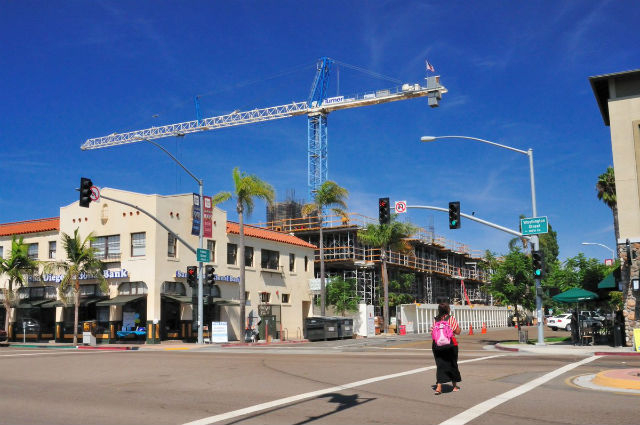
If you’re wondering why Uptown Planners has become a prime target of City Hall’s war on planning groups, the battle over the unpopular Plan Hillcrest offers a case study.
When the Uptown community first questioned the city’s radical proposal to shoehorn more density into an already congested community, the planning group went to work. After seeing what looked like development overreach — 50,000 new residents, 30-story buildings – they requested public records that might elucidate how this startling proposal was conceived and crafted.
The city responded with a 600-document data dump. Undaunted, Uptown leaders sifted through the pile and zeroed in on several dozen relevant document pages.
That extensive research uncovered a cat’s cradle of highly-paid city employees who are managing highly-paid consultants to sell rampant densification to a public that isn’t buying.
Catering to a state government that rains money on overstuffed housing, the City Hall bureaucracy is spending millions of tax dollars to advance a single political goal: justify cramming as much new construction as possible into unwilling neighborhoods.
To cite one example, records indicate that over several years, 32 city employees have devoted nearly 9,000 hours — over $1 million in staff time — to working on Plan Hillcrest. Much of that staff time was spent overseeing at least a dozen consultants whose city contracts for planning services fall in the range of $10 million.
What exactly did those consultants do? According to the documents, their work included:
- Staging polished multi-media presentations that lavished praise on housing saturation.
- Engineering convoluted public surveys that skewed responses to fit policy goals.
- Developing land use planning components based on generic principles that do not address the unique needs of specific communities.
“A lot of money was spent so consultants could try to sell us a pre-ordained plan and so staff could pretend they valued our input,” said former board member Lu Rehling, who led the data mining effort.
“City policy requires this city government to work in partnership with planning groups like ours,” Rehling continued. “Responding to strong community concerns, we pushed back hard on many aspects of Plan Hillcrest that run counter to the community’s actual needs in areas like infrastructure, transportation, clean air, open space, and most critically, affordable housing.”
“We spoke up, the community spoke up, and it was all in vain. Why do city officials spend all that money on public dog-and-pony shows when they have zero interest in heeding what the public wants?”
In a just society, the due diligence of Uptown Planners in fulfilling their mandate to represent their community would win praise from elected officials.
But this is San Diego, where the only community input that counts is the complacent kind.
At this writing, the City Council seems poised to remove Uptown Planners from their elected seats and replace them with a complacent group proposed by Vibrant Uptown advocacy group. No other San Diego planning group is facing a similar ouster. The council will decide Uptown Planners’ fate on Tuesday, May 21, at 2 p.m.
But there’s a catch. Once seated, the Vibrant group would have to hold public meetings where angry constituents would scrutinize them closely and hold them accountable. And they would have to comply with state and city laws and compete in open elections.
Vibrant is off to a rocky start. One of their leaders has reportedly announced, even before taking their seats, that they’ve bought software to run future elections. Since they could not have deliberated in a public meeting before taking that action, they may have violated the Brown Act. It’s not clear where they got the money for the purchase or how they chose the vendor.
Stay tuned. This could get interesting.
Kate Callen is a former journalist and long-time community activist in North Park who ran for City Council earlier this year.

